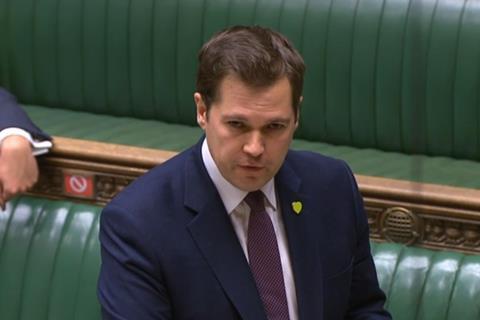Housebuilders sceptical as communities secretary promises to look at ways to speed delivery
Housebuilders have reacted with scepticism to comments by Robert Jenrick suggesting the government is considering taxing developers if they don’t build out planning permissions quickly enough.
Writing in the Daily Telegraph yesterday, the communities secretary said the government was going to “look at ways of ensuring sites build out as expected”, after the Local Government Association (LGA) last week raised concerns over unused planning permissions for more than one million homes.

Jenrick (pictured, left) said measures under consideration “could include levies on land with planning permission that has not been built out”, adding that “no option is being taken off the table”.
Jenrick said in the article that the government’s proposed planning reforms, which have been branded a “developers’ charter” by backbench Tory critics, were in fact designed to “remove the power from the big developers and hand it back to local communities and small builders”.
His comments follow a call by the LGA, which has argued against the need for root and branch reform of planning, to increase the pace of housebuilding by instead allowing local authorities to levy council tax on unbuilt permissions.
However, Andrew Whitaker, director of planning at the Home Builders’ Federation, said he doubted whether the government would seriously consider taxing unbuilt permissions, as it would act as a “massive deterrent” on housebuilders bringing forward planning applications.
If brought in, he said, “you won’t see applications for large-scale development at all, you’ll just see applications for individual small sites. It would create a huge amount of unnecessary work for planning authorities and would have very strange unintended consequences.”
Jenrick’s pledge to consider a developer levy came despite the fact that a review commissioned under the Theresa May government and carried out by Oliver Letwin in 2018 said the housebuilding industry was not guilty of landbanking, but simply built out developments at a rate that avoided flooding the local market.
Whitaker said: “It has been demonstrated time and time again that the industry doesn’t landbank, most recently by [the] Letwin [review]”.
Jenrick also used his article to defend the government’s intention to embark on serious reform of the planning system, after coming under pressure over the issue in recent days. He described the planned changes as “home ownership reforms to promote a simpler, faster and more predictable planning system”, arguing that the current system was “not fit for purpose”.
Rather than his own proposals being a developers’ charter – the accusation levelled at the government last week by former PM Theresa May – Jenrick said that the current system was “heavily weighted in favour of the applicants, big developers who can afford expensive lawyers and know how to navigate the system”.
He said the new system would make it “easier for locals to influence plans for their area and have their say on the location and standard of new development”.
This is despite the fact that the proposals, as outlined last year in the planning white paper, were designed to more than halve the amount of time spent producing local plans, and to remove the ability of local councillors to turn down applications in designated growth areas.










No comments yet